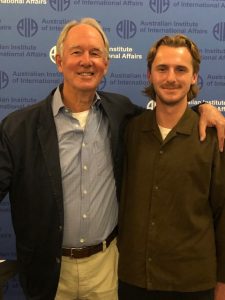Myanmar – a personal history
Myanmar and its history, culture and people were the subject of a talk at AIIA NSW by Peter Church on 27th September. Professor Peter Church AOM has spent his career in South-East Asia and India as a lawyer, corporate advisor and author, and recently has turned to hosting a podcast to share the stories of Myanmar’s citizens. He told both his own and others’ stories of life in Myanmar, providing insights into the history and present situation of the nation.
Peter began his talk with an overview of the 19th and 20th century history of Myanmar and its government. He spoke of the disruption that the three Anglo-Burmese wars throughout the 1800s had on the autonomy and social structure of the nation, culminating in all of Myanmar coming under British rule in 1886. Peter suggested that these wars are the root of much of the instability in Myanmar today.
Peter mentioned the significance of the Panglong Agreement, signed in 1947 – a year prior to Myanmar’s independence from British Rule. Under the agreement, the Burmese government and three ethnic groups – the Shan, Kachin and Chin – agreed to unite under one state. However, months later Aung San, the orchestrator of the agreement, as well as other government MPs, were assassinated. Additionally, the Karen, one of the largest ethnic groups in Myanmar, was left out of the Panglong agreement, and in the nation’s subsequent years of independence this led to much conflict.
In 1962 Ne Win led the first coup d’état in Myanmar and arrested the government’s president and MPs at gunpoint. In the aftermath of the coup, businesses across the nation were nationalised, the military expanded, and protests were violently quelled. After more than a decade of liberation lasting from 2010 to 2021, in which the military Junta was dissolved, Myanmar’s government underwent another coup last year and in 2022 remains under military rule.
Peter played recorded stories from people he had met and interviewed during his time in Myanmar. Multiple interviews detailed experiences of living under Myanmar’s military regime, as well as stories about Ne Win. Some of Peter’s own experiences in Myanmar were shared, such as his journey to becoming a (temporary) Buddhist monk, and the growth of his friendships with those he interviewed and other business contacts.
Peter was asked many questions, including about education in Myanmar, rumours about the 1947 assassinations, the nation’s relationship with wealth in Singapore, and actions against the current military junta. Peter spoke of the disparities between government and private schools in Myanmar, as well as the completely insular nature of the military beginning from schooling through to the army. He provided insight into Myanmar’s wealth, particularly from the north which is resource-rich in jade, gemstones, oil and gas, mostly exported to Singapore, as well as suggesting the most likely culprits behind the historic assassinations were ultranationalist Burmese actors. On the matter of current sanctions against Myanmar’s junta, Peter was critical. He suggested that neither ASEAN nor Australia had properly instigated actions, and that US and UK sanctions were less effective than hoped. He concluded that protest and conflict was likely to continue.
Report by Oliver Owens, AIIA NSW intern
 Peter Church with intern Oliver Owens
Peter Church with intern Oliver Owens